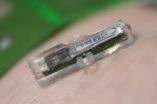(Press-News.org) Washington, DC — Sexually naïve male mice respond differently to the chemical signals emitted by newborn pups than males that have mated and lived with pregnant females, according to a study published March 20 in The Journal of Neuroscience. The findings may help scientists to better understand the changes that take place in the brains of some mammals during the transition into parenthood.
Sex differences in the behaviors mice display toward newborn pups are well documented. While virgin female mice routinely provide parental care to pups upon first encounter, sexually naïve males react to pups with aggression, sometimes attacking and killing them. Previous studies have shown that male mice that have mated and lived with pregnant females (“fathers”) will display parental behaviors similar to females when exposed to infants (such as gathering and grooming mice), even when the offspring are not their own.
In order to better understand the brain mechanisms underlying the transition from aggressive to parental behavior, Kashiko Tachikawa, PhD, and colleagues at RIKEN Brain Science Institute in Japan compared cellular activity in the brains of sexually naïve male mice to fathers following exposure to pups. Pup exposure led to greater activation of nerve cells in the vomeronasal organ (VNO) — a specialized sensory organ in the nose that detects pheromones — and connected brain regions involved in processing emotional information in the sexually naïve male mice compared with fathers.
“The findings suggest that when a male mouse experiences fatherhood, specific physiological events in the brain compel him to nurture young pups,” said Garet Lahvis, PhD, who studies the social behavior of juvenile mice at Oregon Health and Science University and was not involved in the study. “These experiments suggest that the mammalian male brain is not simply hardwired for competition but flexibly wired to nurture,” he added.
Additional tests suggested that suppressing the response of the VNO to pup pheromones may influence the behavioral transition from attack to parenting in sexually naïve male mice. When the researchers removed the VNO in those males, they found that they stopped their aggressive behavior and instead displayed parental behaviors toward the pups. Removing the VNO in the fathers had no effect on the parental behaviors displayed toward pups.
“Our study is the first to suggest that the chemical cues received by the vomeronasal organ evoke aggressive behavior toward pups in sexually-naïve male mice but not in fathers,” Tachikawa said.
Although she cautioned it is not possible to draw direct parallels to human behavior based on the results of the study, Tachikawa noted that “the findings may someday pave the way toward understanding the brain mechanisms responsible for paternal behavior common to other mammals.”
###
This research was funded by the Ministry of Education, Culture, Sports, Science, and Technology of Japan.
The Journal of Neuroscience is published by the Society for Neuroscience, an organization of nearly 42,000 basic scientists and clinicians who study the brain and nervous system. Tachikawa can be reached at kashiko@brain.riken.jp. More information on how life experiences change the nervous system can be found on BrainFacts.org. END
Sexually naïve male mice, fathers respond differently to pups
Study highlights brain changes that may underlie transition from aggressive to parental behavior
2013-03-20
ELSE PRESS RELEASES FROM THIS DATE:
Under the skin, a tiny laboratory
2013-03-20
VIDEO:
EPFL scientists have developed a tiny, portable personal blood testing laboratory: a minuscule device implanted just under the skin provides an immediate analysis of substances in the body, and a...
Click here for more information.
Humans are veritable chemical factories - we manufacture thousands of substances and transport them, via our blood, throughout our bodies. Some of these substances can be used as indicators of our health status. A team of EPFL scientists ...
High potency statins pose significantly higher risk of kidney injury than low potency, say experts
2013-03-20
Research: Use of high potency statins and rates of admission for acute kidney injury: multicenter, retrospective observational analysis of administrative databases
Editorial: Statins in acute kidney injury: friend or foe?
Patients taking high potency statins for high blood pressure are at a 34% higher risk of being hospitalised for acute kidney injury (AKI), compared with those taking low potency statins, a paper published today on bmj.com suggests.
The use of statins is often recommended to reduce the risk of cardiovascular disease among high risk patients. However, ...
Mayo Clinic neurologists present research at American Academy of Neurology Annual Meeting
2013-03-20
SAN DIEGO — Mayo Clinic neurology experts will present research findings on Parkinson's disease, Alzheimer's disease, sleep disorders, concussions, multiple sclerosis and more at the American Academy of Neurology annual meeting in San Diego, March 16. They also are available to offer expert comment on other research findings.
Mayo studies being presented and their embargo times include:
Cognitively normal people with high amyloid levels likelier to develop dementia
EMBARGOED until Monday, March 18, 2013, 1:30 p.m. EDT
People who aren't showing signs of cognitive ...
New disorder could classify millions of people as mentally ill
2013-03-20
Personal View: The new somatic symptom disorder in DSM-5 risks mislabeling many people as mentally ill
Millions of people could be mislabeled as mentally ill when psychiatry's bible of diagnoses is updated in May, warns a senior doctor in this week's BMJ.
The next edition of the American Psychiatric Association's Diagnostic and Statistical Manual of Mental Disorders (DSM-5) – used around the world to classify mental disorders - will include a new category of somatic symptom disorder.
But Allen Frances, Chair of the current (DSM-IV) task force warns that the DSM-5 ...
Studies for approval of new drugs have insufficient patients to evaluate safety
2013-03-20
For medicines intended for chronic use, the number of patients studied before regulatory approval is insufficient to properly evaluate safety and long-term efficacy, requiring the need for new legislation, according to a study by European researchers published in this week's PLOS Medicine.
Current European guidelines specify that in order to fully evaluate the safety of medicines being developed for chronic (long-term) treatment of non-life threatening diseases, at least 1000 patients must take the new drug and that 300 and 100 patients must use the drug for 6 and 12 ...
African immunization systems fall short, African experts say
2013-03-20
In Africa, issues of vaccine supply, financing, and sustainability require urgent attention if the Millennium Development Goals are to be achieved, according to African experts writing in this week's PLOS Medicine.
Shingai Machingaidze, Charles Wiysonge, and Gregory Hussey from the University of Cape Town in South Africa commend African countries for their progress in immunisation programmes but infectious disease outbreaks, for example, polio and measles outbreaks, as well as high vaccine dropout rates across the region, indicate failures within the immunisation system. ...
For polar bears, it's survival of the fattest
2013-03-20
One of the most southerly populations of polar bears in the world – and the best studied – is struggling to cope with climate-induced changes to sea ice, new research reveals. Based on over 10 years' data the study, published in the British Ecological Society's Journal of Animal Ecology, sheds new light on how sea ice conditions drive polar bears' annual migration on and off the ice.
Lead by Dr Seth Cherry of the University of Alberta, the team studied polar bears in western Hudson Bay, where sea ice melts completely each summer and typically re-freezes from late November ...
Caffeine 'can significantly protect against crash risk' for long distance heavy vehicle drivers
2013-03-20
Research: Use of caffeinated substances and risk of crashes in long distance drivers of commercial vehicles: case-control study
Long distance commercial drivers who consume caffeinated substances such as coffee or energy drinks, to stay awake while driving, are significantly less likely to crash than those who do not, even though they drive longer distances and sleep less, finds a study published today on bmj.com.
Long distance drivers routinely experience monotonous and extended driving periods in a sedentary position, which has been associated with wake time drowsiness, ...
'Kill Bill' character inspires the name of a new parasitoid wasp species
2013-03-20
Parasitoid wasps of the family Braconidae are known for their deadly reproductive habits. Most of the representatives of this group have their eggs developing in other insects and their larvae, eventually killing the respective host, or in some cases immobilizing it or causing its sterility. Three new species of the parasitoid wasp genus Cystomastacoides, recently described in the Journal of Hymenoptera Research, reflect this fatal behavior.
Two of the new species were discovered in Papua New Guinea, while the third one comes from Thailand. The Thai species, Cystomastacoides ...
Max Planck Florida Institute study points to major discovery for Alzheimer's disease
2013-03-20
FLORIDA, March 19, 2013 – The Journal of Neuroscience has published a study led by researchers at the Max Planck Florida Institute for Neuroscience, the first and only U.S. extension of the prestigious Max Planck Society, that may hold a stunning breakthrough in the fight to treat Alzheimer's disease. The study potentially identifies a cause of Alzheimer's disease—based on a newly-discovered signaling pathway in cellular models of Alzheimer's disease—and opens the door for new treatments by successfully blocking this pathway. The Institute, which recently opened in December ...
LAST 30 PRESS RELEASES:
DEGU debuts with better AI predictions and explanations
‘Giant superatoms’ unlock a new toolbox for quantum computers
Jeonbuk National University researchers explore metal oxide electrodes as a new frontier in electrochemical microplastic detection
Cannabis: What is the profile of adults at low risk of dependence?
Medical and materials innovations of two women engineers recognized by Sony and Nature
Blood test “clocks” predict when Alzheimer’s symptoms will start
Second pregnancy uniquely alters the female brain
Study shows low-field MRI is feasible for breast screening
Nanodevice produces continuous electricity from evaporation
Call me invasive: New evidence confirms the status of the giant Asian mantis in Europe
Scientists discover a key mechanism regulating how oxytocin is released in the mouse brain
Public and patient involvement in research is a balancing act of power
Scientists discover “bacterial constipation,” a new disease caused by gut-drying bacteria
DGIST identifies “magic blueprint” for converting carbon dioxide into resources through atom-level catalyst design
COVID-19 vaccination during pregnancy may help prevent preeclampsia
Menopausal hormone therapy not linked to increased risk of death
Chronic shortage of family doctors in England, reveals BMJ analysis
Booster jabs reduce the risks of COVID-19 deaths, study finds
Screening increases survival rate for stage IV breast cancer by 60%
ACC announces inaugural fellow for the Thad and Gerry Waites Rural Cardiovascular Research Fellowship
University of Oklahoma researchers develop durable hybrid materials for faster radiation detection
Medicaid disenrollment spikes at age 19, study finds
Turning agricultural waste into advanced materials: Review highlights how torrefaction could power a sustainable carbon future
New study warns emerging pollutants in livestock and aquaculture waste may threaten ecosystems and public health
Integrated rice–aquatic farming systems may hold the key to smarter nitrogen use and lower agricultural emissions
Hope for global banana farming in genetic discovery
Mirror image pheromones help beetles swipe right
Prenatal lead exposure related to worse cognitive function in adults
Research alert: Understanding substance use across the full spectrum of sexual identity
Pekingese, Shih Tzu and Staffordshire Bull Terrier among twelve dog breeds at risk of serious breathing condition
[Press-News.org] Sexually naïve male mice, fathers respond differently to pupsStudy highlights brain changes that may underlie transition from aggressive to parental behavior



